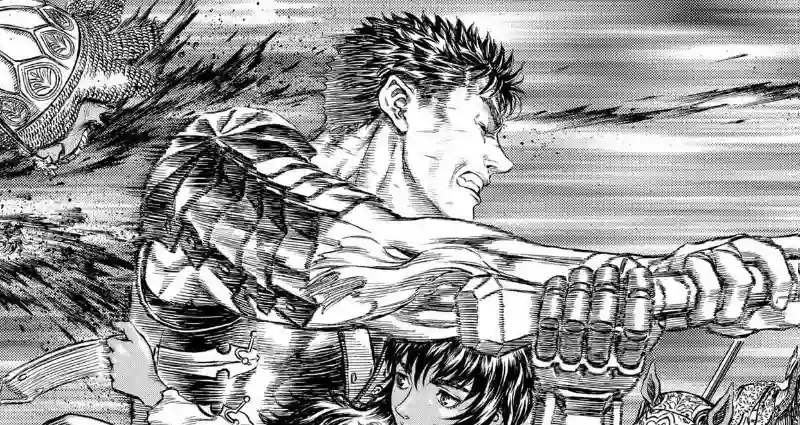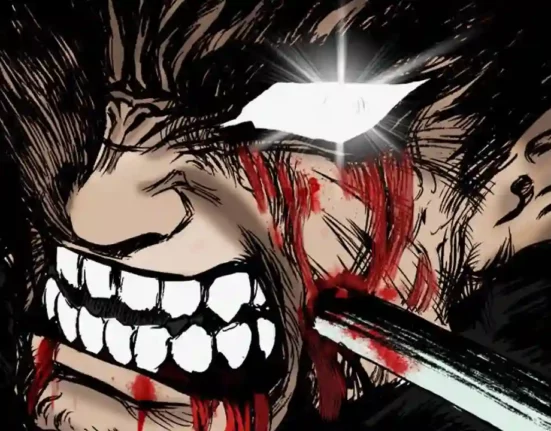In the shadowy and enigmatic world of Kentaro Miura’s “Berserk,” one of the most mysterious and compelling elements is undoubtedly the Behelit. This crimson, egg-shaped artifact plays a pivotal role in the narrative, serving as a catalyst for some of the series’ most harrowing events. In this article, we will delve into the secrets and symbolism behind the Behelit, exploring its significance and the mysteries it holds within the dark and intricate tapestry of the “Berserk” manga.
The Behelit: A Malevolent Artifact
The Behelit is introduced early in the “Berserk” series as a mysterious object with otherworldly properties. It is typically depicted as a small, crimson egg-shaped pendant adorned with eerie eyes and a sinister, toothy grin. This grotesque appearance immediately sets it apart from other objects in the series and foreshadows its malevolent nature.
The Behelit possesses an inherent power that is central to its role in the narrative. When activated under specific, ominous circumstances, it triggers a profound and nightmarish transformation, summoning powerful and malevolent beings known as the God Hand. These entities serve as cosmic agents of fate, manipulating the destinies of individuals in the “Berserk” world.
Activation of the Behelit
The activation of the Behelit is a pivotal moment in “Berserk.” Its power is unleashed when its owner reaches the depths of despair and anguish, often as a result of severe trauma or suffering. This despair acts as a catalyst, causing the Behelit to undergo a startling transformation. Its eyes open wide, and it begins to bleed from its mouth, signaling the commencement of a supernatural ritual.
During this ritual, the Behelit calls forth the God Hand, a group of transcendent beings who oversee the flow of fate and wield immense power. The God Hand then offer the owner of the activated Behelit a choice, known as the “Eclipse.” This choice is typically a Faustian bargain, offering the possibility of achieving one’s deepest desires at a terrible cost.
The Eclipse: A Nightmarish Transformation
The Eclipse event, triggered by the Behelit’s activation, is one of the most infamous and nightmarish sequences in “Berserk.” It serves as a turning point in the series, marked by horror, brutality, and the ultimate betrayal of trust. Those who are marked by the Behelit and choose to accept the God Hand’s offer are subjected to a gruesome and terrifying ordeal.
During the Eclipse, the chosen individuals are transported to an otherworldly realm known as the Abyss, where they are confronted by grotesque and demonic creatures. The God Hand themselves preside over the event, orchestrating a blood-soaked and surreal spectacle that culminates in the transformation of the chosen into powerful and nightmarish entities known as Apostles.
This nightmarish transformation is a testament to the dark and visceral nature of “Berserk.” It is a sequence that shocks and disturbs readers, as they witness the physical and emotional degradation of beloved characters. The Behelit’s role in initiating the Eclipse event adds layers of complexity to its symbolism, as it becomes a catalyst for unspeakable horrors.
Symbolism and Themes
The Behelit serves as a symbol of despair, temptation, and the corrupting influence of power. Its activation represents a character’s descent into the depths of despair, where their longing for power, revenge, or escape from suffering blinds them to the consequences of their choices. This symbolism is closely tied to the larger themes of “Berserk,” which explore the darkness of the human soul and the moral ambiguity of ambition.
The Faustian bargain offered by the God Hand during the Eclipse is a recurring motif in literature and mythology. It embodies the idea of making a pact with dark forces in exchange for power or desires fulfilled. In “Berserk,” this theme is explored in a visceral and unforgiving manner, forcing characters and readers alike to grapple with the consequences of their choices.
The Behelit is also a symbol of inevitability and the inescapable nature of fate in the “Berserk” world. Those marked by the Behelit are often fated to a tragic and nightmarish destiny, and their choices, while seemingly free, are ultimately manipulated by the God Hand. This exploration of fate and free will is a central theme in the series, adding layers of philosophical depth to the narrative.
Legacy and Impact
The Behelit has become an iconic symbol not only within the “Berserk” series but also in the world of manga and anime. Its unique design and profound symbolism have left a lasting impression on fans and creators alike. The activation of the Behelit and the subsequent Eclipse event have become emblematic of the series’ dark and uncompromising narrative.
As readers continue to explore the mysteries of the Behelit and its role in the “Berserk” world, it remains a symbol of both fascination and dread. Kentaro Miura’s storytelling prowess and his ability to craft intricate and haunting symbolism have solidified the Behelit’s place as one of the most memorable and enigmatic elements of the manga medium.
Conclusion
The Behelit is a central and mysterious element in Kentaro Miura’s “Berserk” manga, serving as a symbol of despair, temptation, and the corrupting influence of power. Its activation triggers the nightmarish Eclipse event, marking a turning point in the series and exposing characters to unspeakable horrors. The Behelit’s profound symbolism and role in the narrative have left an indelible mark on the world of manga and anime, solidifying its place as an iconic and enigmatic artifact that continues to captivate readers and creators alike.




